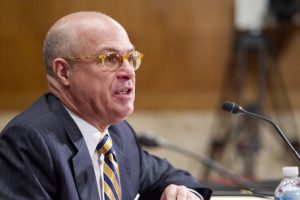Project KISS has transformed the Commodities Futures Trading Commission’s (CFTC) Division of Swap Dealers and Intermediary Oversight (DSWIO).
Matthew Kulkin is the head of CFTC’s DSWIO and he made a speech in front of the New York City Bar Association on May 15.
DSWIO is one of four divisions inside the CFTC.
The other three are: Clearing and Risk, Enforcement, and Market Oversight.
DSWIO’s “primary oversight responsibility over derivatives market intermediaries, including commodity pool operators (‘CPOs’), commodity trading advisors (‘CTAs’), futures commission merchants (‘FCMs’), introducing brokers (‘IBs’), major swap participants (‘MSPs’), retail foreign exchange dealers (‘RFEDs’), swap dealers (‘SDs’) (collectively, ‘Registrants’), and the associated persons of the foregoing, as well as designated self-regulatory organizations (‘SROs’).” Kulkin said during his speech.

Project KISS, or Keep it simple stupid, was one of the signature policy ideas of CFTC Chair Chris Giancarlo.
Project KISS was CFTC wide initiative which examined its regulations with the goal of streamlining and eliminating regulations which were burdensome or overlapping.
During his speech, Kulkin described how Project KISS was implemented in his division.
He listed four policy ideas which have already been implemented.
- Streamlined Chief Compliance Officer Duties and Annual Reports: In August 2018, the Commission adopted amendments to rule 3.3 related to the duties of chief compliance officers of SDs, MSPs, and FCMs. These amendments clarified and modified certain requirements for preparing, certifying, and furnishing to the Commission an annual report containing an assessment of the registrant’s compliance activities. The amendments provide greater clarity regarding the CCO’s reporting line and the CCO’s duties with respect to administering policies and procedures specific to the registrant’s business. Several of the modifications and clarifications contained in the amendments further harmonize associated CFTC and US Securities and Exchange Commission regulations.
- Reduced Regulatory Burdens Associated with Swap Dealer Segregation Notices: In March 2019, the Commission adopted a final rule modifying a swap dealer’s notice requirement obligations related to the right to elect segregation.
- Provided Relief for Designated Self-Regulatory Organizations: In March 2019, the Commission adopted an amendment to rule 1.52, revising certain minimum standards that a designated SRO must maintain in its financial surveillance program over FCMs.
- Proposal to Codify Certain Commodity Pool Operator and Commodity Trading Advisor Staff Letters: In October 2018, the Commission proposed a series of amendments related to CPOs and CTAs. This proposed rule, in part, would provide regulatory certainty to market participants by including relief set out in various staff no-action letters directly in the Commission’s regulations. The proposed changes would also help advance the CFTC’s ongoing effort to harmonize rules with the SEC regulations. DSIO staff is hard at work incorporating the feedback received into final recommendations for the Commission.
He said there was still more work to be done.
“There is much more work to be done. This includes, as discussed by Mike Gill, the Chairman’s Chief of Staff, at the National Press Club in February 2018,]simplifying risk management rules for FCMs and SDs, by providing a more effective programmatic risk management system, and modifying quarterly risk reporting obligations. We continue to review certain parts of the swap dealer business conduct standards regime, as well as ways to make our CPO/CTA regulation better reflect our statutory objectives. With all of this work, we prioritize coordination and collaboration with our peers at the SEC to harmonize our requirements for dual Registrants.
“We are constantly evaluating how staff can provide a better “customer experience” for our Registrants. As part of our internal Project KISS assessment, we realized we can do a better job making Division information easily accessible by Registrants and market participants. In the last few months, DSIO has launched a new website[8] that serves as a resource for the public containing our mission statement, senior staffs’ contact information, as well as links to recent Commission rulemakings, staff letters, NFA resources, and other valuable materials. DSIO has also worked with our colleagues to improve the CFTC’s staff letter website, making it easier for market participants to search for and locate relevant staff letters.”
He said future regulation must foster market liquidity.
“In developing policy recommendations, DSIO spends considerable time evaluating the costs and benefits to market participants, as well as the impact such recommendations may have on market quality. This evaluation should be continuous. DSIO expects our Registrants to regularly review and revise their policies and procedures – not just to ensure they demonstrate compliance with our rules – but also to accurately reflect their business. Firms’ methods constantly evolve to better align with emerging technologies and industry best practices. In other words, they improve and adapt.
“We should do the same. If our rules have unintended negative consequences, we should address them. If our rules are unduly impeding innovation and competition, we should reconsider their application. We, too, should improve and adapt to the constant evolution of our markets.”









